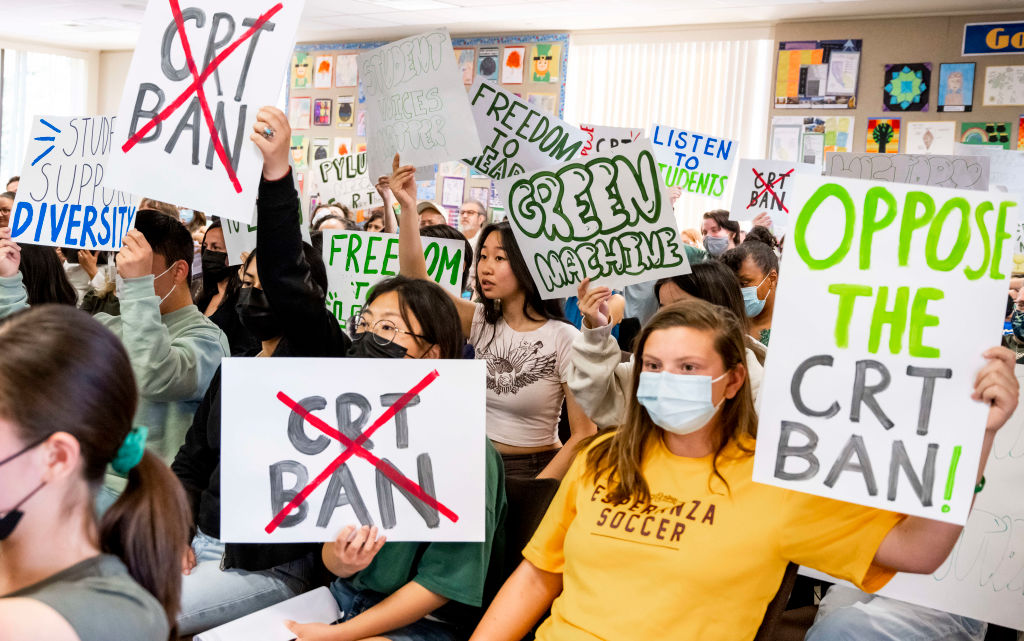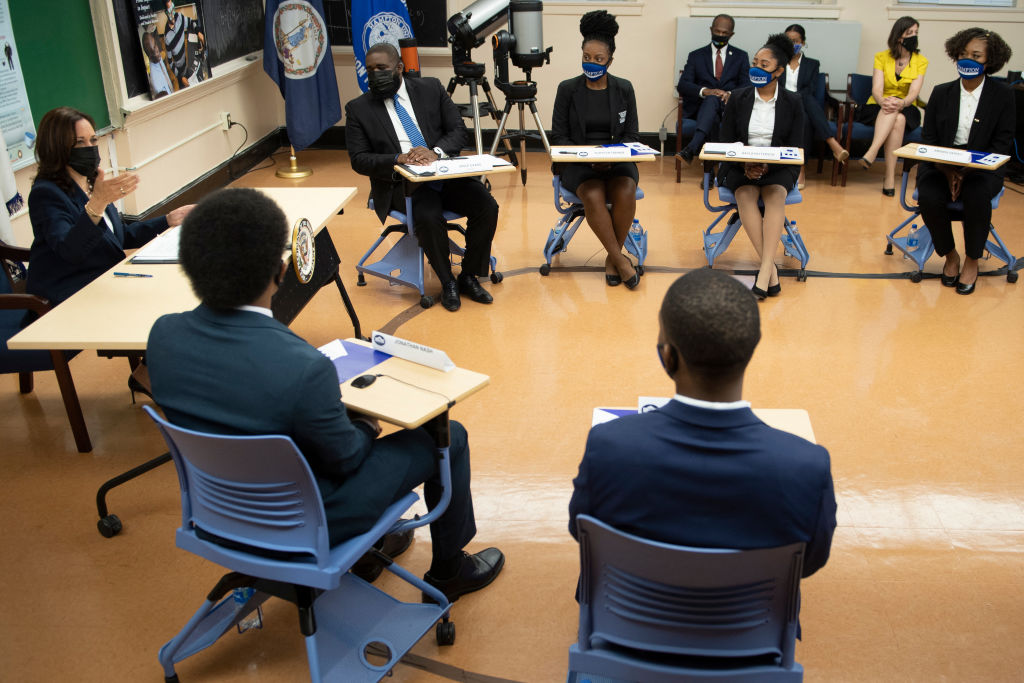The Critical Race Theory Explainer Every White Person Should Read

Source: Maskot / Getty
After an 18-year-old self-avowed white supremacist massacred elderly Black people shopping in a Buffalo supermarket, the Republican hypocrisy around the dangers of talking about race became clear as day. As party leaders, state legislators, governors, and media allies spent the past year distorting, they were also contributing in many ways to how white people were internalizing issues of race.
Whether they call it great replacement theory, the idea that white people are somehow a victimized community to be overtaken by other groups feeds fear and grabs for power that can have dire consequences for Black and other communities of color.
Critical Race Theory is not an alternative or comparable concept to white supremacist ideologies like the great replacement theory. It also does not in any way mandate or dictate the oppression of white people.
And while this isn’t the first-time critical race theory has been distorted as an attack, in the current political climate combined with widespread disinformation it has real consequences. Even well-intentioned liberals have gotten the concept wrong simply reducing this to being about teaching accurate history.
But as a framework, it’s so much more than that. Here are some basic facts about the legal framework known as critical race theory.
What is critical race theory?
The NAACP Legal and Education Defense Fund defines critical race theory as “an academic and legal framework that denotes that systemic racism is part of American society — from education and housing to employment and healthcare.” Critical Race Theory recognizes that racism is more than the result of individual bias and prejudice. It is embedded in laws, policies, and institutions that uphold and reproduce racial inequalities.
It is a framework developed by a group of legal scholars used to examine the impact of racism on various aspects of society. Arising after the major civil rights legislative victories of the 1960s, critical race theory and its theorists see the law as an equalizing tool that can provide remedies to address injustice.
Central to the idea is that racism is not limited to individual decisions and actions. And because racism is a part of society, there are persisting disparities in quality-of-life areas such as housing, health care, education, wealth, and employment.
Who created critical race theory?
Many regard professor Derrick Bell as a major influence in the theory’s creation and subsequent development. A law professor at both Harvard and NYU, Bell influenced an entire generation of lawyers and legal schools, many of whom helped shape the commonly understood principles and aspects of the theory. Like with other types of academic schools of thought, there are people who have become recognized as critical race theorists like legal scholars Richard Delgado, Kimberlé Crenshaw, Mari Matsuda, and Angela Harris.
Where did critical race theory come from?
The idea that the legal system could address racial injustice and discrimination predates the coining of the term critical race theory. Even before the modern civil rights movement, Black and other people impacted by discrimination sought redress in the courts. It was the legal strategy of the NAACP Legal Defense and Education Fund including the historic case Brown v. Board of Education.
Considered a non-legal primer for beginners, “Critical Race Theory” by Delgado and law professor Jean Stefancic provides a basic overview of the framework.
The book “Critical Race Theory” outlines several generally agreed upon components of the framework.
- Racism is difficult to resolve – it is baked into the fabric of American society and culture and as such will take a lot to address. There is no single fix.
- Race is a social construct – this means that while there may be some general similarities between people with “common origin” it is overgeneralized for the purpose of societal categorization. Being a social construct doesn’t make it have any less of a real impact on people’s lived experiences, it just means that it doesn’t have an origin in actual biology or other scientific principles.
- Racism persists because of “interest convergence” – based on Bell’s work, the idea is that large segments of society have little incentive to address racism. Bell even suggested that some “advancements,” like the majority decision in Brown were accomplished because of a perceived benefit by white elites and not because of a desire to achieve equality. Columbia Law lecturer Alexis Hoag, revisited this idea in the context of the COVID-19 pandemic and racial justice protests.
- Differential racialization – basically this is the idea that different groups may be racialized or diminished in different ways at different points in time. This could also be seen as stereotyping in media and entertainment depictions. Black people in America are constantly bombarded with negative stereotypes depending on the needs and interests of whites. Black men are viewed as ‘threatening,’ or called ‘criminals’ These stereotypes unconsciously shape the perception of our society, deeming Black men dangerous and white men less of a threat.
- Intersectionality – essentially this acknowledges that each person has many aspects of their identity. They cannot be identified by one singular characteristic. For example, a Black person may also identify as a woman, a Christian, a lesbian, and so on.
- Voice-of-Color – this idea recognizes that Black and other marginalized communities have different experiences and histories. There is a presumption that belonging to a particular group gives an individual better insight into race and racism.

Source: MediaNews Group/Orange County Register via Getty Images / Getty
What is taught in critical race theory?
Whether as a stand-alone course or taught within a broader course dealing with race, racism, and the law critical race theory At its core, “critical race theory provides tools for challenging racial disparities in public life when existing antidiscrimination law has proven insufficient.”
As Dorothy Brown noted in the introduction to “Critical Race Theory: Cases, Materials and Problems,” a legal textbook, the framework draws on the lived experiences and perspectives of people from impacted communities. It combines storytelling and narrative frameworks to paint a real picture of the issue being discussed.
So a critical race theory lesson could include a conversation on how whiteness became developed as a mechanism of excluding Black and other people of other from fully participating in society.
What does critical race theory have to do with schools?
Conservative groups have whipped predominantly white parent groups around the country into a panic that their children will be made to feel bad if critical race theory is allowed in school. Handouts and brochures developed by some national organizations claimed concepts like diversity and inclusion and social-emotional learning were a part of critical race theory being taught in schools.
These concepts have been presented in a negative light with the claim that it is detrimental to the well-being of primarily white children. Also, the idea that schools are following or have otherwise adopted a critical race theory curriculum is intentionally misleading. It’s a scare tactic used to roll back advancements made by efforts to create diverse and inclusive curriculums.
In a letter to Texas Attorney General Ken Paxton, the Lawyers Committee for Civil Rights Under Law highlighted how efforts to undermine critical race theory and restrict conversations about racism in the classroom undermine constitutionally protected diversity principles.
“Broadly banning diversity and inclusion practices would invalidate anti-discrimination laws, violate foundational constitutional principles, and lead to inconsistent application of education curricula that centers a white, heteronormative perspective,” said David Hinojosa, director of the Lawyers Committee’s Educational Opportunities Project. “Our diversely rich communities deserve inclusive education free from unjust political restrictions.”
Battles over textbooks and curriculum are unfortunately not new.
“Our public education curricula have long ignored and marginalized the experiences and perspectives of Black people and other communities of color as we struggle to grapple with our racist past and tackle the racial inequalities that persist to the present day,” said Jin Hee Lee, senior deputy director of litigation for the NAACP Legal Defense Fund.

Source: BRENDAN SMIALOWSKI / Getty
NewsOne has extensively covered stories from around the country about critical race theory and the movement to suppress the ideas. The hot button issue has caused tension in state capitols and school board meetings across America. Below we have summarized some of the most important CRT stories from the past year.
Louisiana Republican Encourages Teaching ‘The Good’ Of Slavery
In April 2021, a Republican state representative in Louisiana went viral for all the wrong reasons after he did some grandstanding during a House session addressing the topic of schools and colleges teaching critical race theory.
While discussing his bill, HB564, addressed “certain concepts related to race and sex in elementary and secondary schools and postsecondary education institutions,” Rep. Ray Garofalo Jr. went so far as to include slavery in his educational equation during his speech on the House floor.
“If you are having a discussion on whatever the case may be, on slavery, then you can talk about everything dealing with slavery: the good, the bad, the ugly,” Garofalo Jr. said.
He was quickly interrupted by his Republican colleague, Rep. Stephanie Hilferty: “There is no good to slavery, though.”
That prompted an outpouring of laughter before Garofalo Jr. tried to clarify his ignorant words.
“I didn’t mean to imply that,” he said of his apparent Freudian slip. “I don’t believe that and I know that’s not the case.”
Idaho Senate Passes Anti-CRT Bill
In Idaho, the Senate on Monday passed a bill preventing public and charter schools and universities from examining how race and racism influence American politics, culture, and the law.
The bill, which passed in the state Senate 27 to 8, would prohibit educators from teaching that individuals of any race, sex, ethnicity, religion, or national origin are responsible for past actions done by members of the same group.
It also would forbid educators from teaching history that suggests a group of people as defined by sex, race, ethnicity or religion are inferior or superior to another.
Oklahoma Governor Puts Feelings Over Facts By Signing Anti-Critical Race Theory Law
In May 2021, following this national trend, Oklahoma Gov. Kevin Stitt signed a new law that prioritizes feelings over progress. House Bill 1775 relies on a distorted framing of Critical Race Theory to prevent “mandatory gender or sexual diversity training or counseling” in higher education institutions. The bill also prohibits teaching race or sex as inherently superior traits.
In a statement supporting HB 1775, Stitt said that students shouldn’t be taught that they are oppressors. He also claimed the law does not prevent teaching about Black Wall Street and the Tulsa Race Massacre, the Trail of Tears, or other important moments in history.
But critical race theory doesn’t teach children they are oppressors or evil for being of a certain race or sex. Critical Race Theory is merely a framework for analyzing ongoing systems of oppression. Sanitized versions of history leave out experiences that directly impact the current condition of many communities.
“HB 1775 at its core, it’s just a flagrant attempt to limit conversations about race and accurate history, and mostly because it makes Americans that look like me – white – feel uncomfortable,” Oklahoma City Public Schools Chair Paula Lewis told a local ABC affiliate.
Critical Race Theory Used To Attack Black Arizona School Board Member
In June 2021, the Chandler Unified School District, in the southeastern section of the Phoenix metropolitan area, joined the battle over critical race theory. Whipped up into a frenzy, “concerned” citizens and parents submitted comments objecting to critical race theory ahead of a school board meeting.
The Arizona Mirror chronicled the right-wing influence running through both the anti-mask and critical race theory opposition across several school districts. Led by Steven Tyler Daniels, a member of the Patriot Party and the Purple for Parents group, school districts in the surrounding area have been under siege with hype about a made-up problem.
Lindsay Love, the first Black woman to serve on the board, did not plan to attend a critical race theory conference in her official capacity. Instead, she submitted a request to attend the Council of Urban Boards of Education’s annual conference in Atlanta. One of four equity councils within the National School Boards Association, the Council on Urban Boards of Education, serves boards of education in urban and “urban-like” areas. Some people opposed the travel request based on the feeling that Chandler was not an “urban” district, despite being located primarily in the city of Chandler.
“If Ms. Love wishes to attend to hear from social activists, then she can do so at her own expense,” a parent said online. “Taxpayers should not be paying for her to attend a conference that clearly supports a detrimental racial narrative!”
Texas High School Suspends Its First Black Principal Over Critical Race Theory Complaints
James Whitfield, the first Black principal to serve at Colleyville Heritage High School in Texas, was the subject of a heated school board meeting back in July where he was called out by one parent in particular who felt that Whitfield promoting a “conspiracy theory of systemic racism” was grounds to be fired. Surprisingly enough, many other parents agreed and even joined in with their own “fire him!” chants.
“I was not given any clear reasoning behind the decision and was not given a timetable regarding further steps,” Whitfield said in a Facebook message. “I was simply told that it was in the best interest of the district.”
Texas Principal Forced To Resign After Being Suspended
After being suspended, James Whitfield was forced to resign after months of controversy surrounding accusations that he forced critical race theory onto students.
In a joint statement, Whitfield and the school district said they had “mutually agreed to resolve their disputes.”
“Both the District and Dr. Whitfield each strongly believe they are in the right. However, each also agrees that the division in the community about this matter has impacted the education of the District’s students,” the statement read in part. “The District and Dr. Whitfield have mutually agreed to resolve their disputes.”
In an interview with NBC News, Whitfield let his feelings be known about his situation.
“This is beyond me,” Whitfield said. “I’m hopeful that we can use this to move forward and to progress and get some true meaningful change and for people to be OK with teaching truth, people to be OK with embracing inclusivity and diversity, celebrating every student that walks through the doors of our schools.”
The View’ Attempted to Talk About Critical Race Theory But Let Conservative Misinformation Dominate The Conversation
In an October 2021 episode of the daytime talk show “The View, featuring former Secretary of State Condoleeza Rice, the panel discussed critical race theory in the Virginia governor’s race. From Whoopi Goldberg’s opening framing about this being simply an issue of concerned parents trying to be involved, the conversation devolves into a dishonest framing of a fabricated issue meant to whip conservative voters into a frenzy.
To be clear if your child is learning critical race theory they are in an upper-level graduate school or law school course. But Rice responds with a mixture of personal testimony and bootstrap commentary about being a little Black child in the segregated south. Rice then sprinkled in some conservative talking points about not wanting white children to feel bad, as she failed to connect how the very history she lived would be excluded from classes if certain groups had their way.
Winsome Sears Bashes Critical Race Theory For White Conservative Applause
During an interview with CNN on Nov 21, 2021, Virginia’s first Black woman lieutenant governor Winsome Sears, came through with a picture-perfect example of what makes her a white nationalist sockpuppet as she decried Critical Race Theory while obfuscating what it actually is.
Sears sat down with CNN host Dana Bash and took issue with Bash saying that CRT isn’t included in Virginia school curricula.
“Well, let me back up, I beg to differ that CRT is not taught,” Sears said.
“I didn’t say that,” Bash interrupted. “I just said it’s not in the curriculum, just to be clear.”
“No, no, no, no, it is part of the curriculum,” Sears responded. “It’s weaved in and out of the curriculum.”
Sears claimed that in 2015 former Gov. Terry McAuliffe’s state board of education had information on how to teach CRT. Even if this is true, it’s curious that this happened in 2015—five years before Republicans began turning CRT into a hot-button political issue. It’s almost as if this academic framework that was founded in 1989 wasn’t a thing conservatives saw as a problem until they discovered its existence just last year.
Black Parents Say Republicans Only Care About White Feelings When They Call Critical Race Theory ‘Divisive’
In Virginia—where newly elected Gov. Glenn Youngkin rode the “I heart whitewashing and hate CRT” bandwagon to gubernatorial victory last month by parading around white mothers and their white issues with the Black history their white children are learning—Black parents are now speaking out about how their concerns with school curriculum went ignored while that of white parents were focused on in the name of not being divisive.
Featured in an op-ed piece published recently by HuffPost, Black parents in Loudoun County, Virginia, talked about how, for years, they showed up to school board meetings—just as the angry white CRT opposers do—to discuss Black students being forced to endure humiliating and disturbing lessons that trivialized slavery by turning it into a game. They said their concerns went ignored, almost as if the conservative purported fear of “divisiveness” is actually the only concern that surfaces when white people are uncomfortable.
Virginia Governor Glenn Youngkin Unveils ‘Day One’ Executive Order Banning Critical Race Theory
Virginia Gov. Glenn Youngkin signaled his commitment to extreme conservativism with a slate of executive orders passed quickly after his inauguration. During his inauguration, he seemed to strike a civil and even bipartisan tone, but a slew of executive orders released by the new governor says otherwise. Immediately after taking office, Youngkin issued 11 executive orders with the first two items on the list a ban on the teaching of critical race theory in schools and mask mandates.
The conservative obsession with critical race theory and efforts like the 1619 Project is not about improving educational opportunities and limiting “divisiveness.” Across the country, book bans and curriculum restrictions represent a backward trend focused on protecting the fragile feelings of white people coming to terms with what it means to be in the minority in the next few decades.
West Virginia Advances The ‘Anti-Racism Act,’
The Anti-Racism Act of 2022 passed the Senate by a 21-12 vote on March 2 and was sent to the House. The bill is similar to the Anti-Stereotyping Act, which was halted in the House Judiciary Committee.”
When Black people complain about racism and stereotyping, we get told we’re “playing the race card.” When white people complain about racism and stereotyping, policy gets made. That’s how white privilege works, and that’s why CRT, a study that examines how race affects law and other institutions, is necessary.
But that doesn’t matter since CRT isn’t taught in K-12 schools. (Although, the fact that the bill also bars the teaching in colleges and universities, the voluntarily-attended institutions it was meant to be taught in, shows they’re selective when it comes to complaints about government overreach.)
“When something’s not happening, why would you vote for a bill that’s causing angst in the classroom? There’s tension in the classroom with this bill,” Sen. Owens Brown (D – Ohio) said while arguing that there have been no clear examples of such lessons in West Virginia schools.
Black Mississippi Senators Walkout Of Vote On Anti-Critical Race Theory Bill
Just days after the Martin Luther King Jr. holiday, the majority-white Republican-controlled state senate passed a bill to ban a concept not taught in public schools. In a video shared by WLBT, viewers can see Black senators walking out of the chamber as a roll call vote begins.
The walkout didn’t stop the vote, but Black senators would rather withhold their participation instead of engaging in a sham process that does not honor and respect the experiences and history of many within the state.
“We walked out as a means to show a visible protest to these proceedings,” state Sen. John Horhn told Mississippi Today.
The outlet recounted a time nearly 30 years ago when the Black caucus boycotted a speech by former Gov. Kirk Fordice, but could not recall a time when legislators walked out of a legislative chamber in the middle of a vote.
Mississippi House Passes Anti-CRT Bill
One day after the West Virginia Senate voted 21-12 to pass the bill and send it to the House, Mississippi’s Republican-controlled House voted 75-43 to pass Senate Bill 2113, another anti-CRT bill that includes nearly the same language as that of West Virginia.
As the Associated Press reports, the bill to “prohibit critical race theory” proclaims that no K-12 school, community college, or university can teach that any “sex, race, ethnicity, religion or national origin is inherently superior or inferior.”
It’s like Mississippi copied West Virginia’s homework damn near verbatim. The only difference is the latter was at least intentional in not including the words “critical race theory” in the language of the bill, likely because legislators knew they’d have to reconcile with the demonstrable fact that CRT absolutely doesn’t teach that any race is superior or inferior to others.
Tennessee House And Senate Passes Bill Prohibiting Critical Race Theory In Colleges
On March 30, the Tennessee legislature passed yet another anti-critical race theory bill that has nothing to do with CRT and everything to do with the fact Republicans deal in propaganda, fragility, and racism. Of course, this time, legislators aren’t going after CRT being taught in K-12 schools—where it literally isn’t being taught—they’re trying to ban what they wrongly think CRT is from public colleges, where academic studies are supposed to be taught.
House Bill 2670 would “prohibit a public institution of higher education from taking certain actions with regard to divisive concepts and the ideologies or political viewpoints of students and employees.”
And because the language in the bill is vague and senseless AF, let’s just go with the Ballotpedia explanation that says the bill “aims to prohibit an individual’s views on critical race theory from influencing decisions about hiring, tenure, promotion, or graduation in the state’s higher education institutions.”
Gov. Ron DeSantis Praises Florida For Rejecting Math Textbooks That Contain Critical Race Theory
The Florida Department of Education has announced it has rejected dozens of math textbooks submitted by publishers because they “contained prohibited topics” including critical race theory.
Out of 132 math books, 54 (or 41 percent) were banned after they were reviewed by the department and found to be “impermissible with either Florida’s new standards or contained prohibited topics.” Out of those 54 books, 28 were “not included on the adopted list because they incorporate prohibited topics or unsolicited strategies, including CRT.”
CLICK HERE to read more about CRT.
SEE ALSO:
40 Acres And A Mule: What Are Reparations And Why Is The Concept So Polarizing?
Understanding Environmental Racism And Its Effect On Black Americans

















